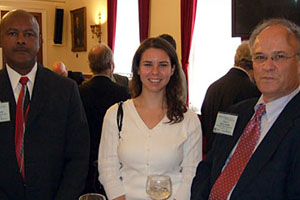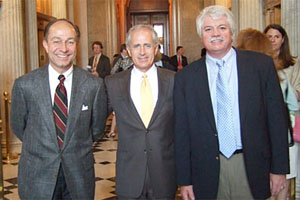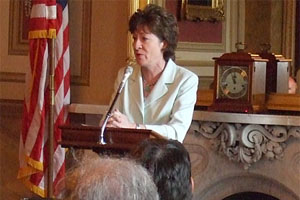May 17, 2007 6:43 AM CDT

The 2007 Masonry Industry Legislative Conference featured an enthusiastic crowd of small business owners and association representatives, all of whom gathered in Washington, D.C., for one purpose — to bring a collective voice for the masonry industry to the decision-makers' doorsteps. Scheduled from May 14-16, this year's conference was sponsored by the Mason Contractors Association of America (MCAA), the Building Stone Institute, the Interlocking Concrete Pavement Institute and the National Concrete Masonry Association. Attendees were afforded the opportunity to meet first hand with congressional leaders to discuss regulatory and legislative matters.
The united industry group conducted Capitol Hill visits and hosted personal meetings with more than 50 lawmakers or their staff, as well as other policy advisors and Washington insiders. The issues on the agenda included the 3-percent government withholding tax, national energy policy, fire safety in construction, estate tax reform and comprehensive immigration reform.
Of course, immigration has taken center stage as the national political issue this year. Congress is debating new proposals to not only curb illegal immigration, but to determine the fate of those undocumented workers who contribute greatly to the U.S. economy, as well as how best to involve the business community in cleaning up or policing our immigrant labor force. All of the conference's scheduled speakers addressed this hot topic, and it was a major talking point among attendees.
Gutierrez said the immigration debate tends to bounce back and forth between two extremes — wholesale amnesty or the mass deportation of 12 million people; neither option is viable, workable or realistic, he said. The fact remains, he stressed, that our population will not be capable of sustaining economic growth unless we continue embracing and assimilating legal immigrants. Therefore, he said the United States needs an immigration solution that allows employers to feel confident that the people they hire are here legally, without such a system being a burden to employers. The business community, he said, should not be expected to serve as the "immigration police."
And as Gutierrez has said before, this is not a Republican or Democrat issue — immigration is an American issue. Thus, he said, at the heart of any new policies must be the stated goal of ensuring future unity among all Americans.
The United States is a nation of immigrants, and it is clear that anyone who wants to come to this country and follow the rules of admission to citizenship or legal status should be welcomed with open arms. But he said that we must not reward those who enter the country illegally with any sort of amnesty proposal.
Westmoreland also has firm opinions on tax relief, both as a state representative and business owner. In fact, he said that the burden the federal tax system places on families and businesses is one of the reasons he first ran for Congress. He supports future reductions in the tax and regulatory burden, and also supports efforts to eliminate the income tax completely, replacing it with a national retail sales tax, also known as the FairTax Plan.

Moving on to the Estate Tax, Coffim touched upon an issue that is almost as close to the hearts and wallets of small business owners as the immigration issue. According to the MCAA, almost one-third of all small business owners will be forced to sell outright or liquidate a significant portion of their company to pay for this tax, which is often termed the "death tax." Coffim said that although the masonry industry would like to see the tax repealed, it is not feasible. She said that the rate, which can be as high as 55 percent of assets received, likely would stay at current levels. Part of the reason, she said, is the pay-go rules.
"Simplifying the tax code would mean taking away people's tax breaks, but there is still a lot that can be done," she said. However, with such a volatile issue, she emphasized that no political moves will be made until after the next presidential election. In the meantime, you can be sure that attendees voiced their concerns during their visits on Capitol Hill.
Of course, this notion won resounding applause and whistles of approval from attendees, but the group promptly refocused and quizzed Clyburn on his stance about the Estate Tax. They asked him if Congress was going to try to eliminate the tax, to which he replied simply, "No." This tax and other revenue sources for the federal government, he said, are vital, referring to the taxes as "shared sacrifices." Although he admitted that the Estate Tax may have some unintended consequences — such as the burden it places on small businesses — Clyburn views the issue as a national security matter. He said that we, as a nation, ought to be able to pass on a country to our children, not just a business, referring to our continually increasing debts with other nations such as China and Japan. Giving up a revenue stream would only increase our international borrowing, he said.
The practicalities for such a system in the United States are limited, DeBaca said. Family immigration that's not limited to the nuclear family has been a boon to the U.S. economy, he said. DeBaca added that any new immigration law would have to preserve competitiveness in the U.S. job market, not undercut businesses or local workers. "At the end of the day, people are not just dying to get here, they're willing to die for us," he said, as he recalled a story of an illegal immigrant who eventually joined the U.S. military and lost his life in the Iraq War.

As proponents of small business and vocal on the issues that affect this industry, each of the senators thanked the group for coming to Washington, D.C., to speak on behalf of the 600,000-plus construction industry professionals in this country. "This is a place that needs more business people," Corker said of the U.S. government. Collins added that it is important when business owners and concerned citizens come to Washington and get their voices heard. And clearly, to many of our elected officials, it is important to them to hear what we have to say.
"Hearing the messages on important issues directly from administration representatives, senators and congressmen gives you a much stronger understanding of the political process and the critical need for each of our industries to be directly involved," said David Jollay, owner of Jollay Masonry in Atlanta. He added: "Almost nothing is done in Washington as a one shot deal. This awareness translates into the need for continual visits, contact and connections."
"The conference provided an excellent opportunity for members of the masonry industry to personally meet with their members of Congress in order to educate them about issues specific to our industry," Bennett added. "During the conference, MCAA members were able to show that MCAA is a strong, grassroots organization that is leading the fight to protect the interests of its members and [to] protect the long-term viability of the masonry industry as a whole."
2007 Masonry Industry Legislative Conference
A collective voice for the masonry industry gathered in D.C.

A reception on Capitol Hill with members of Congress and congressional staff. Photo courtesy of NCMA.
The 2007 Masonry Industry Legislative Conference featured an enthusiastic crowd of small business owners and association representatives, all of whom gathered in Washington, D.C., for one purpose — to bring a collective voice for the masonry industry to the decision-makers' doorsteps. Scheduled from May 14-16, this year's conference was sponsored by the Mason Contractors Association of America (MCAA), the Building Stone Institute, the Interlocking Concrete Pavement Institute and the National Concrete Masonry Association. Attendees were afforded the opportunity to meet first hand with congressional leaders to discuss regulatory and legislative matters.
The united industry group conducted Capitol Hill visits and hosted personal meetings with more than 50 lawmakers or their staff, as well as other policy advisors and Washington insiders. The issues on the agenda included the 3-percent government withholding tax, national energy policy, fire safety in construction, estate tax reform and comprehensive immigration reform.
Of course, immigration has taken center stage as the national political issue this year. Congress is debating new proposals to not only curb illegal immigration, but to determine the fate of those undocumented workers who contribute greatly to the U.S. economy, as well as how best to involve the business community in cleaning up or policing our immigrant labor force. All of the conference's scheduled speakers addressed this hot topic, and it was a major talking point among attendees.
Speakers
Throughout the three-day conference, attendees were visited by a rather impressive group of policymakers and delegates from several federal agencies, which demonstrated to the group that issues important to the masonry industry are important to the federal government.Secretary of Commerce Carlos Gutierrez
U.S. Secretary of Commerce Gutierrez is one of President Bush's point men working with Congress to pass comprehensive immigration legislation, an issue the secretary sees as one of the greatest domestic social issues of our time. Gutierrez believes a successful immigration solution must focus first on securing our borders, but must also address immigrants' contributions to our economy and the importance of American unity.Gutierrez said the immigration debate tends to bounce back and forth between two extremes — wholesale amnesty or the mass deportation of 12 million people; neither option is viable, workable or realistic, he said. The fact remains, he stressed, that our population will not be capable of sustaining economic growth unless we continue embracing and assimilating legal immigrants. Therefore, he said the United States needs an immigration solution that allows employers to feel confident that the people they hire are here legally, without such a system being a burden to employers. The business community, he said, should not be expected to serve as the "immigration police."
And as Gutierrez has said before, this is not a Republican or Democrat issue — immigration is an American issue. Thus, he said, at the heart of any new policies must be the stated goal of ensuring future unity among all Americans.
Rep. Lynn Westmoreland (R-GA)
In Congress, Westmoreland serves on the Transportation and Infrastructure, Small Business, and Government Oversight and Reform committees. As a member of the Small Business Committee and as owner of a construction company, L.A.W. Builders, Westmoreland understands the needs of the masonry industry. The congressman has joined with other members of Congress in the Immigration Reform Caucus, carefully studying what can be done to deal with the immigration problems our country faces. As he told attendees, his basic stance on the issue is as follows:The United States is a nation of immigrants, and it is clear that anyone who wants to come to this country and follow the rules of admission to citizenship or legal status should be welcomed with open arms. But he said that we must not reward those who enter the country illegally with any sort of amnesty proposal.
Westmoreland also has firm opinions on tax relief, both as a state representative and business owner. In fact, he said that the burden the federal tax system places on families and businesses is one of the reasons he first ran for Congress. He supports future reductions in the tax and regulatory burden, and also supports efforts to eliminate the income tax completely, replacing it with a national retail sales tax, also known as the FairTax Plan.

Tennessee Sen. Bob Corker (center) with conference attendees David Jollay and Andy Sneed. Photo courtesy of NCMA.
Elizabeth Coffim, Tax Council, House Ways and Means Committee
Speaking on behalf of Rep. Jim McCrery (R-LA), chairman of the House Ways and Means Committee, Elizabeth Coffim kept the group's attention focused on tax policy. She began by discussing the so-called "pay-as-you-go rules" instituted by the new, Democrat-controlled House of Representatives, which basically require that any new tax breaks proposed by the House be offset by tax increases or budget cuts elsewhere so that the federal budget is "revenue neutral." Coffim said that Republicans in Congress have not enjoyed this rule — also termed the "pay-go rules" — because, for example, it affects the government's ability to institute changes quickly. The Senate actually has had a similar pay-go rule in place since 1993, but the rule has been modified many times to accommodate tax break proposals and spending measures. The House measure likely will face similar revisions.Moving on to the Estate Tax, Coffim touched upon an issue that is almost as close to the hearts and wallets of small business owners as the immigration issue. According to the MCAA, almost one-third of all small business owners will be forced to sell outright or liquidate a significant portion of their company to pay for this tax, which is often termed the "death tax." Coffim said that although the masonry industry would like to see the tax repealed, it is not feasible. She said that the rate, which can be as high as 55 percent of assets received, likely would stay at current levels. Part of the reason, she said, is the pay-go rules.
"Simplifying the tax code would mean taking away people's tax breaks, but there is still a lot that can be done," she said. However, with such a volatile issue, she emphasized that no political moves will be made until after the next presidential election. In the meantime, you can be sure that attendees voiced their concerns during their visits on Capitol Hill.
Rep. James Clyburn (D-SC)
House Majority Whip Clyburn was the first guest to speak before the Legislative Conference attendees on Wednesday, May 16. In addition to discussing current federal budget proposals — and the differences in philosophies between the Republicans and Democrats — Clyburn also focused on immigration. To him, immigration — and to a larger extent the issue of shortages of skilled craftspersons in the construction industry — is an education issue. He said that there is a serious lack of proper education spending in the United States, particularly when it comes to vocational training. "Education has to refocus," Clyburn said. "It can't all be liberal arts. ... It was a mistake to take the trades out of the education system."Of course, this notion won resounding applause and whistles of approval from attendees, but the group promptly refocused and quizzed Clyburn on his stance about the Estate Tax. They asked him if Congress was going to try to eliminate the tax, to which he replied simply, "No." This tax and other revenue sources for the federal government, he said, are vital, referring to the taxes as "shared sacrifices." Although he admitted that the Estate Tax may have some unintended consequences — such as the burden it places on small businesses — Clyburn views the issue as a national security matter. He said that we, as a nation, ought to be able to pass on a country to our children, not just a business, referring to our continually increasing debts with other nations such as China and Japan. Giving up a revenue stream would only increase our international borrowing, he said.
Lou DeBaca, Legislative Attorney, House Judiciary Committee
To provide more insight into the immigration debate, particularly about what the Senate was debating during mid-May, the Masonry Legislative Conference organizers invited Lou DeBaca, a legislative attorney with the House Judiciary Committee, to speak to the group. As DeBaca explained, the Senate was trying to develop a viable policy first and they would handle the politics later. A key proposal under consideration, he said, was whether to amend the U.S. immigration system from the typical family-based system used now to a points-based system. The points system, used by many European nations, for example, assigns points to immigration applicants based on education, skills, etc., with higher resulting scores equating to a better chance for a green card.The practicalities for such a system in the United States are limited, DeBaca said. Family immigration that's not limited to the nuclear family has been a boon to the U.S. economy, he said. DeBaca added that any new immigration law would have to preserve competitiveness in the U.S. job market, not undercut businesses or local workers. "At the end of the day, people are not just dying to get here, they're willing to die for us," he said, as he recalled a story of an illegal immigrant who eventually joined the U.S. military and lost his life in the Iraq War.
Brian Clark, Staff Member for Sen. Sam Brownback (R-KS)
The discussion on immigration con-tinued with a legislative aide from Sen. Sam Brownback's office. Brian Clark said the Senate should be working toward a bill that doesn't place the entire burden on U.S. employers for filtering out undocumented workers. Employers are not police officers, he said. The current system, he said, provides more of an incentive for people to come over and work illegally. A better, nationwide system of employment verification, with some form of worksite enforcement policy, would be the ideal compromise, Clark said. "We want to make [the process] as clear for you as we can," he said, because "employers are the economic engine for our country. Politics should be set aside because our country needs the workers."
Sen. Susan Collins addresses questions at the Senate briefing. Photo courtesy of NCMA.
Senate Briefing
All attendees were in agreement on Clark's final point as they left the early morning engagement and headed toward the Capitol Building on Wednesday afternoon for a planned Senate briefing. Between the many scheduled votes for the day, several senators and one Judiciary Committee member took the time to stop by the Lyndon B. Johnson Room on the second floor to address the conference attendees and to take a few questions. Among those who gave of their time were Phil Kiko, chief council, Senate Judiciary Committee; Sen. Jon Tester (D-MT); Sen. Bob Corker (R-TN); and Sen. Susan Collins (R-ME).As proponents of small business and vocal on the issues that affect this industry, each of the senators thanked the group for coming to Washington, D.C., to speak on behalf of the 600,000-plus construction industry professionals in this country. "This is a place that needs more business people," Corker said of the U.S. government. Collins added that it is important when business owners and concerned citizens come to Washington and get their voices heard. And clearly, to many of our elected officials, it is important to them to hear what we have to say.
"Hearing the messages on important issues directly from administration representatives, senators and congressmen gives you a much stronger understanding of the political process and the critical need for each of our industries to be directly involved," said David Jollay, owner of Jollay Masonry in Atlanta. He added: "Almost nothing is done in Washington as a one shot deal. This awareness translates into the need for continual visits, contact and connections."
Conclusion
Attendees at the conference had the unique opportunity to hear from — and really converse with — some of the "power players" in the nation's capitol, Bennett said. To have the opportunity to hear from powerful individuals such as Secretary of Commerce Carlos Gutierrez, a member of the president's cabinet, and Majority Whip James Clyburn, the House of Representatives' third highest-ranking member, was truly a memorable experience, she said."The conference provided an excellent opportunity for members of the masonry industry to personally meet with their members of Congress in order to educate them about issues specific to our industry," Bennett added. "During the conference, MCAA members were able to show that MCAA is a strong, grassroots organization that is leading the fight to protect the interests of its members and [to] protect the long-term viability of the masonry industry as a whole."
About the Author
Cory Sekine-Pettite is an editor for Lionheart Publishing and was the founding editor of Masonry Design magazine.


















